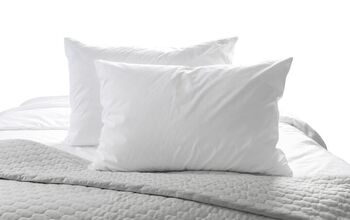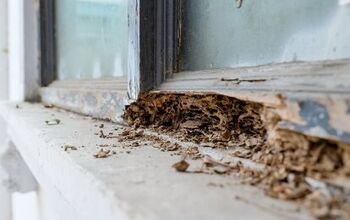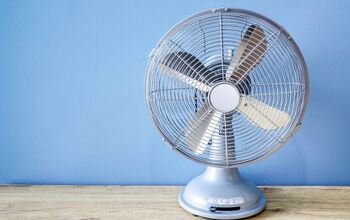How Often Should You Replace Your Bedding?

Do you take your bedding for granted? After all, it’s easy to get used to your bedding and lose track of how long you’ve used the same set of sheets. So, how often should you replace your bedding?
Many homeowners replace their sheets every 2-6 years. Pillows must be replaced every 5-10 years or sooner if they become lumpy, uncomfortable, and stained from sweat and oil. Ideally, you should get new blankets every 3-15 years, depending on the thread count and materials. Comforters last up to 25 years if you wash them carefully and avoid using bleach.
There is no iron-clad rule about when you should replace your bedding. Simply pay attention to how comfortable your bedding is and decide when to replace it from there. Wash your bedding at least twice each month. Follow along as we explore how often you should replace your bedding.
How Long Does Bedding Last?
1. Sheets
Ideally, you should replace your sheets every 2-6 years or sooner as needed. Sheets with a low thread count must be replaced within 2-3 years in many cases. They wear out much faster and easily become thin and stained.
Linen sheets are the most durable and they can last up to 5 years with proper care. You can extend the lifespan of your sheets if you hang them to dry. This helps prevent tearing, shrinking, and wrinkling that can quickly damage your sheets.
Use mild detergent and cold water to protect your sheets and avoid shrinking or staining them. Avoid washing your sheets with bleach and fabric softener, or else they may get damaged. Try not to wash your sheets with other items made of hard fabric, such as polyester.
2. Pillows
Pillows don’t last nearly as long as most other types of bedding. It makes sense when you consider how much sweat and oil winds up on pillows when you sleep. Sweat and oil can damage both the case and the pillow itself.
That’s why you must replace your pillows every 2 years, in many cases. Granted, high-end pillows can last 5-10 years, but even they become less comfortable over time. Pillows eventually become less firm as you sleep and sweat on them for years.
Stains also form, and heavily used pillows often smell badly. Pillows are prone to bacteria, mites, and other pests that are hard to spot with the naked eye. This can trigger your allergies, cause health problems, and ultimately make you uncomfortable.
3. Blankets
You must replace your blankets every 3 to 15 years depending on the material. For example, thin blankets with a low thread count often go bad in 3 years. Synthetic and wool blankets can last 10 to 15 years if you maintain them and wash them carefully.
The average throw blanket lasts at least 5 years. You can expect an electric blanket to last 5 to 7 years, but the electric component may fail sooner. It helps to wash your blankets once every 7 to 14 days.
This can protect the fibers from sweat and oils from your skin that would otherwise damage them. Granted, you can keep nostalgic blankets and quilts indefinitely to hold onto the memories. That said, you may simply want to retire them from use to preserve them after many years.
4. Comforter
Comforters often last longer than other types of bedding, such as sheets. For example, many homeowners replace their comforters every 15 to 25 years. That’s because comforters are thick, durable, and typically made of durable natural and synthetic materials.
Comforters made of a blend of natural and synthetic fibers often last the longest. They offer the best of both worlds between durability and comfort. Make sure to follow the instructions before you wash a comforter to ensure it lasts as long as possible.
For example, some comforters are meant to be washed in cold water as opposed to warm water. Many homeowners put their comforters in the dryer and then finish drying them by hanging them up. This helps prevent it from shrinking and suffering damage.
5. Duvet
Duvets are more fragile than most types of bedding, and you must replace them every 3 ½ years, on average. The average duvet doesn’t last longer than 5 years before it becomes worn and visually unappealing. You can reduce your duvet’s lifespan if you wash it more than once every 6 to 12 months.
Look for a duvet with a high thread count if you want to avoid replacing it too soon. Low-quality duvets may only last 2 years, especially if you have pets that scratch them. It helps to use a duvet cover to protect it from quickly wearing thin.
6. Mattress
Mattresses typically last 7 to 10 years before you must replace them, but it varies. For example, cheap, thin mattresses can go bad in as little as 5 years. Latex mattresses offer the most longevity as they can last up to 15 years with proper care.
You can tell it’s time to replace your mattress if you often wake up sore in the morning. Mattresses slowly wear down over time due to body weight, sweat, and natural oils. Holes, tears, and sagging sections can also indicate that your mattress must be replaced.
Mattresses become lumpy over time, and they can become quite uncomfortable. The older your mattress is, the more likely it is to trigger your allergies. It’s time to replace your mattress if it’s full of dust, oil, sweat, and allergens that make you sick.
How Often Should You Wash Your Bedding?
Ideally, you should wash your bedding once every 1 to 2 weeks. However, you can wait longer to wash your bedding if you often leave town for business trips and vacations. That said, your bedding can still smell stale and gross even if you don’t sleep in your bed often.
Dust, sweat, oil, and dead skin cells quickly accumulate in unwashed bedding. Dust mites are drawn to dirty bedding that is full of dust and dead skin cells. Not only can dust mites trigger allergies, but they also reproduce quite quickly.
Dust mites can lay up to 50 eggs in just 3 weeks, so it’s not worth it to put off washing your sheets. At least wash your pillowcases and sheets twice per month. That said, you will have the best results if you wash your bedding weekly.
Should You Replace Your Bedding If You Had Bed Bugs?
You don’t need to replace your bedding if you have eliminated bed bugs. However, many homeowners replace their bedding after an infestation. This is a great idea if you use several chemicals to treat your bed for bed bugs.
Summing It Up
You should replace your sheets every 2-6 years and get new pillows every 2-10 years. Comforters go bad in 15 to 25 years depending on the material, and you must replace duvets every 2 years. You can wait 7 to 15 years before you replace your mattress.
Related Guides:

Nick Durante is a professional writer with a primary focus on home improvement. When he is not writing about home improvement or taking on projects around the house, he likes to read and create art. He is always looking towards the newest trends in home improvement.
More by Nick Durante






















![Standard Dining Room Table Dimensions [for 4, 6, 8, 10 and 12 People]](https://cdn-fastly.upgradedhome.com/media/2023/07/31/9074335/standard-dining-room-table-dimensions-for-4-6-8-10-and-12-people.jpg?size=350x220)




